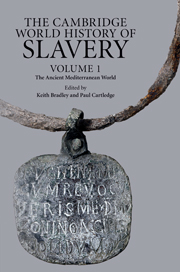Book contents
- Frontmatter
- Contents
- Series editors' introduction
- List of figures
- Acknowledgements
- Introduction
- 1 Slavery in the ancient Near East
- 2 Slaves in Greek literary culture
- 3 Classical Athens
- 4 The Helots: a contemporary review
- 5 Slavery and economy in the Greek world
- 6 The slave supply in classical Greece
- 7 Slavery and the Greek family
- 8 Resistance among chattel slaves in the classical Greek world
- 9 Archaeology and Greek slavery
- 10 Slavery in the Hellenistic world
- 11 Slavery and Roman literary culture
- 12 Slavery in the Roman Republic
- 13 Slavery Under the Principate
- 14 The Roman slave supply
- 15 Slave labour and Roman society
- 16 Slavery and the Roman family
- 17 Resisting slavery at Rome
- 18 Slavery and Roman material culture
- 19 Slavery and Roman law
- 20 Slavery and the Jews
- 21 Slavery and the rise of Christianity
- 22 Slavery in the late Roman world
- Bibliography
- General index
- Index of ancient passages cited
- Index of inscriptions and papyri
- Index of Jewish and Christian Literature Cited
19 - Slavery and Roman law
Published online by Cambridge University Press: 28 September 2011
- Frontmatter
- Contents
- Series editors' introduction
- List of figures
- Acknowledgements
- Introduction
- 1 Slavery in the ancient Near East
- 2 Slaves in Greek literary culture
- 3 Classical Athens
- 4 The Helots: a contemporary review
- 5 Slavery and economy in the Greek world
- 6 The slave supply in classical Greece
- 7 Slavery and the Greek family
- 8 Resistance among chattel slaves in the classical Greek world
- 9 Archaeology and Greek slavery
- 10 Slavery in the Hellenistic world
- 11 Slavery and Roman literary culture
- 12 Slavery in the Roman Republic
- 13 Slavery Under the Principate
- 14 The Roman slave supply
- 15 Slave labour and Roman society
- 16 Slavery and the Roman family
- 17 Resisting slavery at Rome
- 18 Slavery and Roman material culture
- 19 Slavery and Roman law
- 20 Slavery and the Jews
- 21 Slavery and the rise of Christianity
- 22 Slavery in the late Roman world
- Bibliography
- General index
- Index of ancient passages cited
- Index of inscriptions and papyri
- Index of Jewish and Christian Literature Cited
Summary
SOURCES
This chapter will consider mainly Roman law of the classical period, between about 200 bc and ad 200. Occasional reference will be made to earlier and later law, such as the Twelve Tables (fifth century bc), and collections made in the late empire, of imperial legislation in the Theodosian Code (Codex Theodosianus), and of imperial responses to individual enquiries in Justinian's Code (Codex Iustinianus). From the mass of surviving Roman law concerning slaves, there will be room to consider only a few salient aspects.
The Digest was commissioned by Justinian in ad 527. It was compiled from the works of the major jurists, especially the five great jurists of the late second and early third century, Papinian, Paul, Modestinus, Ulpian and Gaius, declared authoritative a century earlier by Valentinian and Theodosius (ad 426). They refer to, or even directly quote, many earlier laws, imperial enactments or responses, and senatorial decrees, and cite legal interpretations by earlier jurists, going as far back as the late Republic. The Digest is also our major source for the content of the Praetor's Edict (see Robinson 1997: 39–42), which was the formal source of most Roman private law, detailing the legal remedies available, and the appropriate formulae, or procedure, for obtaining them. The Edict is particularly important as providing a means by which legal contracts made via slaves could be enforced against their owners – in other words, they made much of Roman business life possible.
- Type
- Chapter
- Information
- The Cambridge World History of Slavery , pp. 414 - 437Publisher: Cambridge University PressPrint publication year: 2011
- 13
- Cited by

